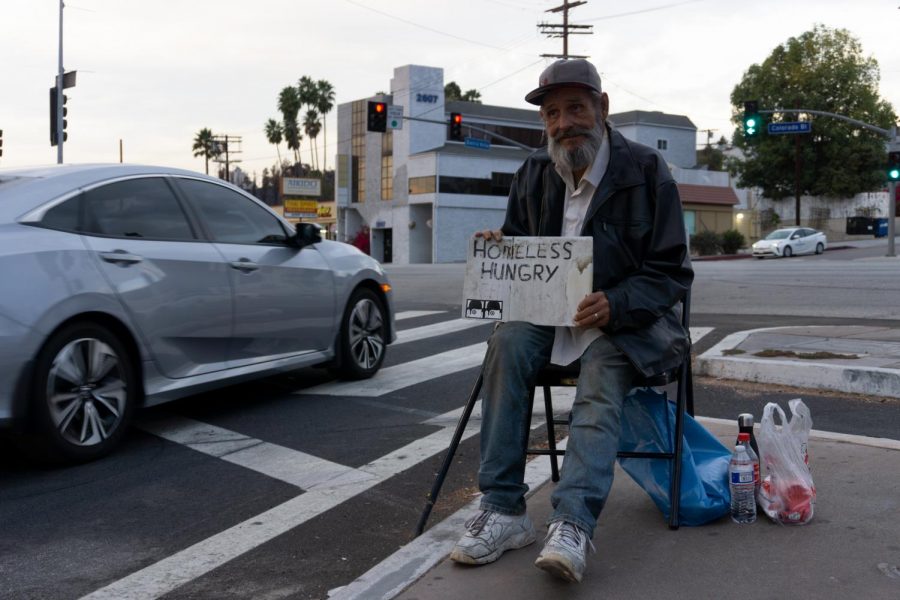It’s not just getting drenched on rainy days that he has to deal with.
It’s not just the loud noises at all hours from teenagers walking by, inches away from him.
It’s not just going days, sometimes weeks, without food.
One of the things Robert Ang is most vulnerable to as a homeless person is crime.
Ang said his possessions were stolen one night while he slept in Downtown L.A.: $500 in cash, identification, cell phones and bank cards. Searching for his belongings, he found all that was left at a nearby ATM was his dysfunctional laptop.
He said he tried to get help from the police but the suspects were not apprehended. The Los Angeles Police Department did not respond to a request for comment about the incident.
The 65-year-old said he’s been homeless for “maybe more than a year or two,” he shared while seated on a bench in Glendale’s Carr Park on a recent afternoon. A Target cart and rolling bag next to him held his possessions. While Ang has a daughter with her own apartment, he was concerned about bringing shame to her over his visibly homeless-appearance. “Look at my face,” he said, providing one explanation why he wouldn’t stay over at her place. He also mentioned having gone two months without eating and referenced how Jesus fasted for 40 days.
The theft he experienced wasn’t the worst of it. Another time while he was in downtown Los Angeles, Ang said a tall, heavyset woman tried to pick a fight with him.
He said he tried to defend himself with an umbrella, but it became a tug of war. “She has more weight, and so I was thrown near the tree and I hit my nose and it was bleeding,” he said.
Ang’s experiences aren’t isolated incidents. Violence in the homeless community has risen, according to an LAPD report released earlier this year. The report shows there while there was a two percent decrease in “citywide crime,” crimes involving the homeless — whether as suspects, victims, or both — rose by 52 percent.
Homelessness expert Gary Blasi, an emeritus professor of law at UCLA, expressed skepticism about the data.
“I am generally cautious in using data on unhoused people derived from sources where their homeless status is not a significant part of the reason the data is collected,” Blasi wrote in an email. “For example, a rape or robbery victim is unlikely to know the housing status of her (or his) assailant but is generally the only source of information about assailants in unsolved crimes against persons. The match between people’s stereotypes about appearances and reality is often not very good.”
Those on the streets who haven’t been victims themselves, have witnessed violence.
Larry McCarter, 61, a native Angeleno who became homeless 10 years ago after losing his job, recalled the time he saw two homeless people fight. He wasn’t sure what the quarrel was about.
“I think they were friends,” said the Eagle Rock resident, holding a sign that reads “homeless” and “hungry.”
The crime wave has inflicted others directly such as Phillip Hahn, 60, who said he’s been homeless for five or six years. “I get robbed about once every six months,” he said outside his tent across the street from Los Angeles City Hall.
Hahn recalled one incident where three people tore open his tent with a razor blade, demanding his possessions. “I fought them off. I fought them off from the inside of my tent. I didn’t have pants on, I was unprepared.”
During his interview, Hahn pulled out weapons he owned for self defense including box cutters, and a taser. “If I feel I’m being threatened or there’s trouble, I’ll just, pardon me”-he then emitted sparks from his taser-“do that. And they go away.”
Some advocates for the homeless feel more policing isn’t the answer. After all, the housing crisis, increase in homelessness and increase in crime among the homeless are all intertwined, they say.
The county homelessness population increased by 12 percent from 2018-2019, while the city’s homeless population saw a 16 percent rise during that time, according to the Los Angeles Homeless Services Authority.
“We’ve seen a legacy from the city of L.A., and really around the country, where increased police presence and criminalization doesn’t work,” said Mike Dennis, director of organizing for Everyone In, a homeless and housing advocate group.
He added, “People get trapped in the criminal justice system, it decreases their ability to pull themselves out of homelessness or poverty and leads to a host of other issues in their life. And so, we firmly believe-and I firmly believe that flooding the zone with services and outreach workers is the best approach.”








